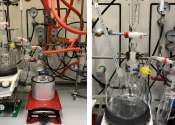Implantable batteries can run on the body's own oxygen
From pacemakers to neurostimulators, implantable medical devices rely on batteries to keep the heart on beat and to dampen pain. But batteries eventually run low and require invasive surgeries to replace.









